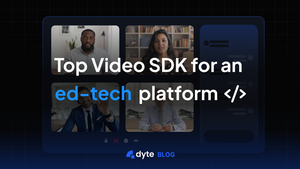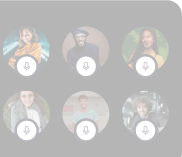Video conferences have emerged as a pivotal tool for revolutionizing how we learn. It's no longer a novelty - it's a necessity, especially in the ed-tech and online education sectors. Whether you're an educator looking to interact with students remotely or a learner seeking to broaden your knowledge base from the comfort of your home, understanding how to use video calling effectively can significantly enhance your educational experience.
This article discusses the features and compliance required in Video SDK to build video interactions for an ed-tech.
What features are required in a Video SDK to build an online education platform?
Building an online education platform requires a Video SDK (Software Development Kit) packed with features to facilitate seamless video communication and enhance the learning experience.
Here are some crucial features to consider:
- Device Compatibility: The Video SDK should support adaptive streaming across all devices (desktop, mobile, tablet) for easy access to educational content anytime, anywhere.
- High-Quality Delivery: To ensure a smooth learning experience, the Video SDK must support high-quality video delivery without buffering or lag.
- Interactive Tools: To foster real-time interaction and engagement in the virtual classroom, you need features like in-built chat, polls, Q&A, whiteboards, incorporation of audio files, videos, simulations, gamification, etc.
- Video Analytics: This feature helps educators track and analyze user behavior, engagement levels, and video performance. Granular video analytics per user and API for video analytics are key aspects to look for.
- Monetization Tools: If the platform is commercial, it should include tools that allow for monetization, such as options for paid courses or subscriptions.
- UI and Feature Customization: The ability to customize the user interface and features according to the specific needs of the educational platform is crucial.
Remember, the priority of Video SDK features should be guided by the specific needs and goals of your online education platform.
What are the compliances required in a Video SDK for building an ed-tech platform?
Compliance requirements for a video SDK in an ed-tech platform involve several key considerations, primarily focused on data security, privacy, accessibility, and ethical operational protocols:
The following broadly covers the compliances required in a Video SDK specific to ed-tech:
- Data Security: The SDK should comply with security standards like SOC 2 to ensure the protection of student data.
- Privacy Laws: It's critical to consider stringent data privacy laws when choosing a Video SDK for an EdTech platform. This includes compliance with regulations like GDPR (General Data Protection Regulation) in Europe that safeguard users' personal data.
However, it is important to note that specific compliance requirements may vary depending on the geographical location and target audience of the ed-tech platform. Always consult with a legal expert or a compliance consultant to ensure all necessary requirements are met.
Let's look at the top 5 video SDK platforms in the context of an ed-tech platform, including Dyte, Vonage, Appitect, Mux, and Agora.
List of top 5 Video SDKs for an ed-tech platform
- Dyte
- Vonage
- Apphitect
- Mux
- Agora
Dyte
Dyte provides all the building blocks you need to create an interactive, engaging, and scalable online learning experience.
Dyte's low-code Video SDK and user-friendly documentation allow you to integrate and go live with fewer lines of code. Dyte offers a real-time video and voice solution for integrating high-quality video/voice calls into web, mobile, and desktop applications and websites.
Features
- Built-in interactive tools
- No-code UI Kit
- Live transcription
- SOC 2 & GDPR compliant
- In-built scalability for up to 10,000 participants
- Provides RTMP Streaming
- Real-time collaboration, file sharing, and whiteboards
Want to know more about Dyte's capabilities? Talk to us, and let's set you up with a seamless interactive experience.
Here's everything you need to know to build an ed-tech platform with Dyte
Pricing
You start with 10,000 free minutes…every month with Dyte. If you exhaust these minutes, you pay $0.004 per user per minute, with recordings and RTMP-out available at $0.010 and $0.015 per minute, respectively. Learn more about Dyte's pricing.
Vonage Video
Vonage video conferencing SDK lets you build video experiences for web, mobile, and desktop software. Integration into your online education platform is relatively fast as long as you have an experienced tech team. It is supported by iOS, Android, and the web.
Features
- Support AES-128 and AES-256 encryption
- GDPR Compliant
- Scalable as required
- Calls encrypted with AES-128 and AES-256
- Allows broadcast messaging
Limitations
- No free trial.
- Doesn't have Polls, an audio room, or multiple audio support.
Pricing
$0.00395/per participant/per minute.
Check out the pricing for Vonage Video Conferencing APIs. If you are looking for a Vonage alternative, we'll make it easier with this Vonage migration guide.
Apphitect
Apphitect offers SDKs for video chats and conferences. It primarily caters to enterprises of varied sizes.
Features
- Has Customizable
- Had White-labeled Solution
- Supports about 100 interactive video call participants
- Includes Group Calls
Drawbacks
- Difficult for beginners to navigate
- Slow customer support
- Difficult to consume documentation
Pricing
Apphitect's pricing isn't transparent, and you'll have to contact their sales team.
Mux
Mux SDK lets you build video streaming and provides call analytics. It provides the ability to implement self-optimizing videos with easier encoding delivery and renditions. There are two major offerings – Mux Video and Mux Data. They have an option for an on-demand version of the video.
Features
- Support for iOS, Android, and web
- Allows up to 100 participants in real-time video calls
- Open APIs
Limitations of Mux API
- No in-built resources to manage mid-call interruptions.
- No plugin support.
- No prebuilt apps or UI
- No built-in interactive features.
Pricing for Mux API
You get a one-time $20 in credits for new sign-ups. Then, you pay $0.004/min for real-time video, $0.04/min for encoding, $0.003/min for storage, and $0.0012/min for streaming.
If you are looking for Mux alternatives, here's a comparison of Agora v/s Mux v/s Dyte.
Agora
Agora's Video SDK lets you embed video calls and live streaming. It is also quite customizable if you have an experienced development team.
Features
- Visual Filters with Custom Masks
- Noise cancellation
- Compatibility with Flutter and React Native
- Supplemental Enhancement Information (SEI)
Limitations
- Required significant developer effort to integrate
- Expensive to scale
Pricing for Agora
Agora's pricing is based on usage and can be somewhat complicated to understand. You can also have a look at our detailed breakdown of Agora's pricing model.
Check out how Agora compares to Dyte.
Compare Video SDK platforms for an Ed-tech platform
| Provider | Features | Limitations | Pricing |
| Dyte | Low-code Video SDK, user-friendly documentation with SOC 2 and GDPR compliance. | Few mobile SDKs are in early stages | 10K free credits each month. Post that $0.004 per participant minute |
| Vonage | Offers a video conferencing SDK and is GDPR compliant | No free trial and has limited interactive functionalities | $0.00395/per participant/per minute |
| Apphitect | Offers SDKs for video chats and conferences. | Navigation can be difficult for beginners, customer support is slow. | Contact Apphitect for pricing details |
| Mux | Provides SDKs for video streaming and call analytics. | Lacks in-built resources for managing interruptions and interactive features. | Starts with $0.004/min |
| Agora | Video SDK allows embedding video calls and live streaming. | Integration requires significant developer effort and can be expensive to scale. | Contact Agora for pricing details |
Conclusion
When building an online education platform, it is important to look out for features like built-in interactive capabilities, device compatibility, scalability, and other customizations.
Various ed-tech platforms like ADP list, Newton school, Pandai, and more trust Dyte. Read how Newton School Reinvented Ed-Tech Delivery with Dyte.
Check out Dyte's Uptime Status (in Real Time), Dyte Pricing, and User Documentation to evaluate yourself.
You can get started yourself with 10K free credits each month. Talk to our team and watch how easy it is to integrate Dyte into your ed-tech platform.




